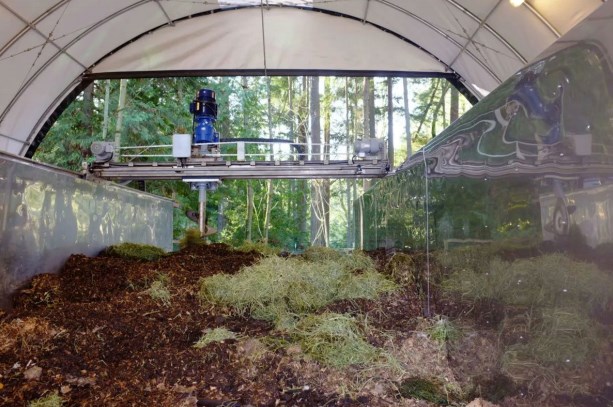The planned On-Island Compost Facility has been scrapped following concerns over its cost and choice of operating equipment.
The long-discussed facility (OICF) was originally sparked more than a decade ago in a 2011 report prepared by the Knick Knack Nook. Various community groups and organizations have worked on making the project a reality since, including the OICF Working Group in 2015. A feasibility study in 2020 was followed by the awarding of a Clean BC Organics Infrastructure Grant worth just over $1 million a year later. The Nook also pledged $100,000 toward the project.
The OICF, which would have been built behind the Bowen Island Recycling Depot, first explored using a ‘Hot Rot’ composting system to process the organic waste. But updated estimates last year showed the island is producing more organic waste than expected. Manager of environment and parks planning Carla Skuce advised switching to an ‘Earth Flow’ system made by Green Mountain Technologies which could process enough waste to meet the island’s needs.
The Earth Flow processes food scraps and yard trimmings into soil, which Skuce said the municipality would sell to help offset costs. The facility would also keep the entire composting process on-island which would save on tipping fees (money paid to send waste elsewhere) and reduce greenhouse gas emissions.
Using the new technology and factoring in the provincial grant, the municipal contribution would be $520,000 on the approximate $1.64 million price tag. Skuce estimated that the facility would cost around $43,000 to operate over the first five years, transitioning to savings of $70,000 a year following that. This would largely be through the saving of tipping fees, which have been increasing lately, along with labour costs.
Monday was decision day for the facility, as the capital project hadn’t yet been included in the 2024 budget. As the municipality deals with several other capital costs and a property tax increase hovering around 10 per cent, once-strong support around the table for the OICF – including approving $5,000 last year to develop design plans – was far more muted during the nearly hour-long discussion on the topic.
“I have been so supportive of this whole idea pretty much all the time I’ve been on Bowen… I really want this to happen, and you add on the idea that we have a $1 million grant that we probably won’t get again if we don’t go ahead now,” said Coun. Tim Wake. “At the same time, I share all the concerns and the last thing I want to do is be raising taxes even more than we’ve already committed to.”
Hesitation to take on more projects was a shared theme among the councillors. “One of the things that we did in our strategic plan was to make the decision that we were going to try and get through a lot of problems that already existed before we started getting into something new,” said Coun. Judith Gedye. “I’m feeling like this is on the edge of being experimental,” she added, while also pondering if people would actually buy the soil produced by the facility.
The lack of widespread Earth Flow use across the province also gave councillors pause, with little evidence of it being employed in other municipalities around B.C. The technology was used in Powell River until recently, but its use was discontinued after residents expressed fear that further use of the system could create unwanted smells.
“From my standpoint this feels like a project that is mired in risk… in a capital works program where we already have a lot of risk,” said Mayor Andrew Leonard, citing current capital projects such as the Cove Bay Water Treatment Plant or Community Centre which have seen financial and time commitments increase from their original predictions.
“I don’t believe operational contingencies have been accounted for, knowing what it takes to start up something that we don’t have any experience in right now,” added Leonard, while also pointing out the the municipality’s contract with Bowen Waste Solutions will be due for renewal shortly after the OICF would be completed and funds will need to be dedicated toward the renegotiation process.
“I’m concerned that the labour cost on this may not be captured accurately, particularly for these first couple years, or even if we can find labour to do this… Given the financial challenges that we have in the municipality, given the risk of what is effectively taking over our own green waste operation and adding a compost sale operation to it as well strikes me as problematic, to put it charitably,” concluded the mayor.
Leonard, Gedye, and Wake were joined by Coun. John Saunders and Alex Jurgensen in voting against moving forward any further with the facility. Chief administrative officer Liam Edwards thanked Skuce and the Knick Knack Nook for their efforts, and said he hopes one day in the future the OICF idea could be resurrected. In the meantime the grant will be returned to the province.



